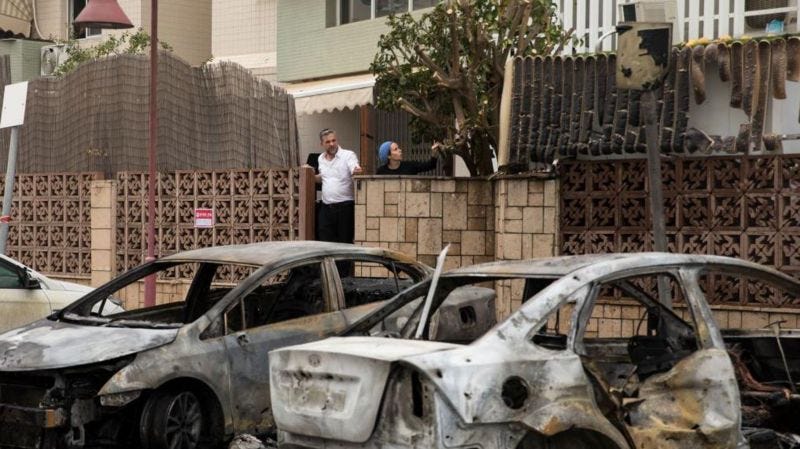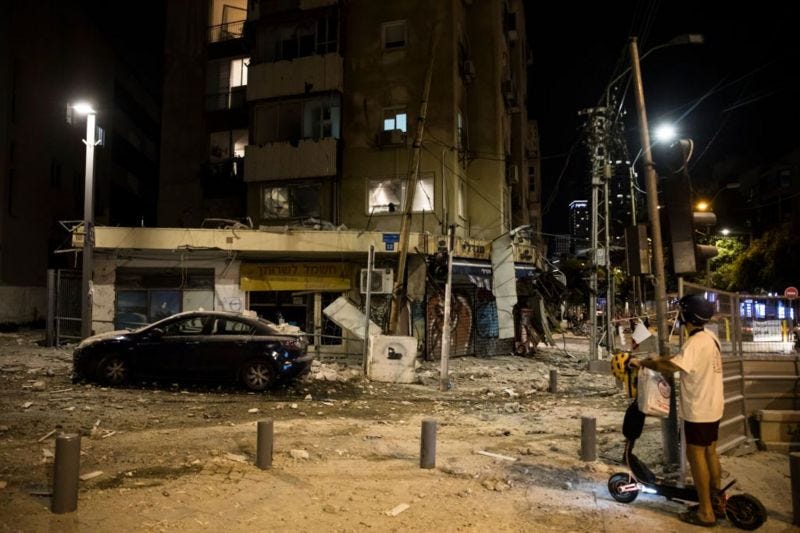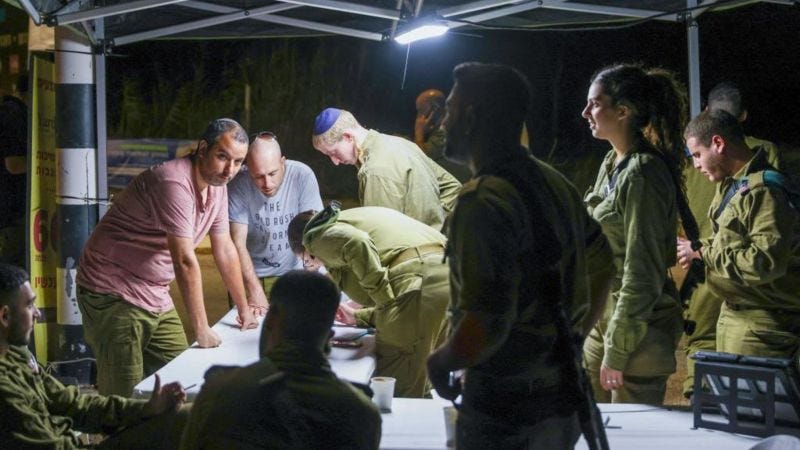WEEKEND READ. Not going anywhere: Russian new arrivals in Israel react to the Hamas attack
Russian-Israelis speak to BBC Russian about how they've been affected by this week's violence, and how it's given many new sense of belonging and pride in their new home.
By Elizaveta Fokht.
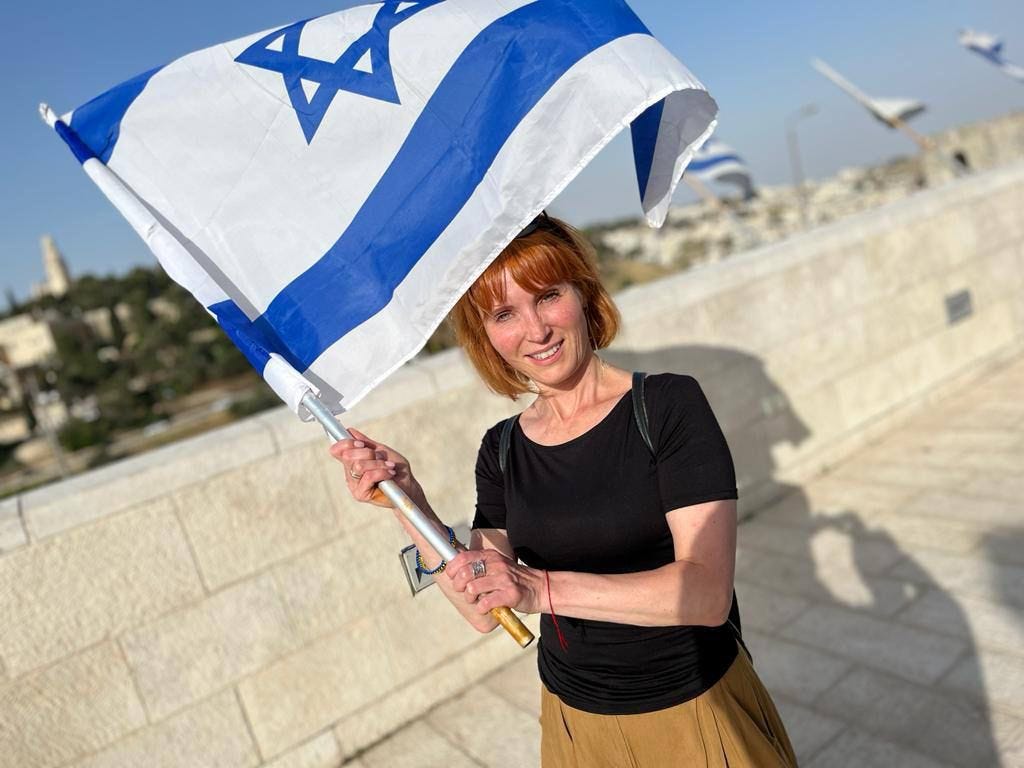
Since the start of the Russian invasion of Ukraine, tens of thousands of Russians have relocated to Israel. They now find themselves in a country at war and traumatised by an attack which caused the worst ever loss of civilian life in Israeli history. BBC Russian has been speaking to Russian-Israelis about how the violence has affected their lives. Without exception our interviewees tell us that despite the shock of the past week, the worried calls from relatives back in Russia, and the undisguised glee from Russian social media trolls, none of them regret the decision to move to Israel and all say the events of the past week have given them a new sense of belonging in their new homeland.
Three days after Russia invaded Ukraine in February 2022, Yuri Saprykin and his wife Vera were sitting in their Moscow kitchen when they heard someone banging on their front door. They looked through the spyhole and saw a local policeman.
Yuri, who had already openly criticized the war in posts on social media, began frantically trying to delete things from his phone. They didn’t open the door, and later discovered from their building’s WhatsApp chat group, that it had all been a false alarm and the policeman was actually looking for their next door neighbour – who was Ukrainian.
"My first reaction was - phew, they weren’t coming for me,” says Yuri.' And then, I thought - wait, what?” It was the moment which finally convinced them to leave Russia. Two months later they were already in Israel, settling into a new life with their son in Tel Aviv.
At first Yuri and Vera were unsure they had made the right decision. Just months after they аrrived, in the summer of 2022 Israeli cities came under attack in the latest escalation of the Israeli-Palestinian conflict. For the new arrivals it was unsettling.
"One day… we were in a taxi when the air raid siren went off. The taxi driver started yelling, 'Get out quickly!'" Yuri recalls. He rushed onto the road with his son in his arms as explosions echoed overhead.
"We hadn't experienced anything like this before," he says.
In the end, the family decided to stay in Israel. Yuri started working as a coach in a children's football academy and the family began to understand more about the complexities of the situation around them.
"In the past few months, amidst the protests [over the past year, Israel has seen protests due to judicial reform - BBC], everyone was discussing the external threat. There was some division within society. Talks of a possible war in the north (on the Lebanese border) were circulating,” says Yuri.
“Emotionally, I was prepared for something to happen. But I wasn't prepared for what happened on the morning of 7 October."
Early on Saturday morning, on the day of the Simchat Torah holiday, Yuri's brother-in-law burst into the bedroom shouting: "The siren is sounding! Get up! Get up!" During this first alert, Yuri didn’t make it to the bomb shelter before the air raid warning was over. In the darkness, half-asleep, he couldn't find his trousers.
"It was quite terrifying and embarrassing," he says with a laugh. "I couldn't see the space around me. When I came out of the building, the siren had already stopped."
Yuri checked a map app showing the locations of rocket strikes, each one usually marked by a red dot. He saw that the whole central area of the country was marked in red. "It was clear that this was something much more serious."
Throughout that day and in the following days, the full horror of what was happening emerged.
Gunmen from Hamas (which is proscribed as a terrorist organisation by many Western countries including the UK) had launched an early morning assault on southern Israel, attacking towns and villages killing soldiers and civilians indiscriminately. After two days of shocking violence 1300 Israelis were dead, and at least 150 people – including old people, women and children, had been taken to Gaza as hostages.
Israeli Prime Minister Benjamin Netanyahu announced that the country was in a state of war, and the Israeli army began retaliatory air strikes on targets in Gaza. At the time of writing power, water and fuel supplies to Gaza have been cut off, more than 1400 people have been killed and more than 330,000 people displaced from their homes.
“It’s easier to leave an aggressor than a victim”
In Tel Aviv, 70 km from Gaza, the air raid sirens sounded and Yuri and his family joined other residents in the bomb shelter under their building. Everyone tried to reassure the new arrivals.
"There was a funny dialogue,” Yuri says. “A woman sitting next to me asked me my name. Then she introduced herself and started saying, 'I'm an actress! And by the way, a very famous actress! And my husband, he's a very famous guitarist!' And I responded, 'Well, my wife is a really great singer!' So, amid the bombings, everyone was showing off to each other."
Yuri has been impressed by the way everyone has rallied round to support each other.
"Everyone I know has their communities, and everyone helps each other. Kindergartens organize Zoom meetings with the kids. I train kids to play soccer - we have online training sessions in the evening. We do exercises that can be done at home."
The family have never once thought about leaving.
"I don't know how to explain it. It's easier to leave an aggressor than a victim. There are a huge number of people here going to defend the borders. What was happening there is a complete catastrophe. All the people here are united by grief. Everyone helps each other, collects humanitarian aid. We are all united, so we have no thoughts of packing our bags and leaving, and I don't think we ever will," Yuri says.
"From the windows, we saw buildings shrouded in smoke"
Tatiana Aleksandrova, from St Petersburg, moved to Israel in the spring of 2023.
She and her family had been planning to make the move since 2019 but the war in Ukraine made them speed up their plans. Her husband and son left soon after the Russian invasion in 2022 and Tatiana followed a year later.
They settled in the southern city of Ashkelon, close to the border with Gaza.
They chose it because her husband’s family – originally from Kherson in Ukraine – were already living in the city. Ironically some family members had themselves only recently arrived after fleeing the Russian assault on Kherson in 2022.
Ashkelon was also a lot more affordable than some other parts of the country.
“This is quite important for a move under the de facto conditions of evacuation," she adds.
Both found work in the city – Tatiana’s husband in a local factory and her with a local television station. Their son got a place in a boarding school in Jerusalem.
On the morning of 7 October Tatiana and her husband were out of town staying with friends for the holidays, and their son, who is 17, was back home in Ashkelon.
They learned that their home town was under attack, from Telegram.
As rockets rained down on the city, hitting residential homes and the hospital, Tatiana and her husband jumped in the car and raced back to find their son. On the way he texted them: “I’m okay”.
It was a nightmare journey, ignoring all safety protocols in their desperation to get home. As they drove they saw Israel’s Iron Dome anti-missile system in action. Most other cars on the roads were parked up under concrete underpasses for protection and people lay by the side of the road taking cover.
As they turned the corner onto their street they could see that a rocket had smashed into the entrance to the five-story block next door. They rushed up the stairs amidst the sounds of sirens, hugged their son and were finally able to calm down.
The family took shelter in a ‘mamad,’ as they are called in Israel – these are safe rooms made of concrete located inside residential apartments.
"The shelling was continuous, occurring every minute or two. Not all strikes were preceded by a siren, so two attempts to have a cigarette break on the balcony ended with ruined cigarettes and spilled coffee on the floor,” Tatiana recalls.
“From the windows, we saw buildings shrouded in smoke and realized that the Iron Dome couldn't handle the volume of work. Everything fell silent around eleven in the morning. There was a long pause – to respond to dozens of calls and messages from around the world, to check the news and videos in Telegram channels, and finally, to ask the question: how the hell could this happen? It was clear that we were in a major war. It wasn't fear, but rather shock – I don't like that clickbait word, but it was precisely shock. We believed too much that we were under impenetrable protection. We let our guard down. And it seems we weren't the only ones who let their guard down, but also those who guaranteed this protection for all of us."
Over the next two days, she and her family spent most of their time in the mamad, as the sirens sounded and there was almost constant barrage of rocket attacks - "There were pauses between attacks, but only pauses."
During the first days of the war, the family received numerous offers to relocate – friends from America and Europe invited them to come and stay till the war was over. However, the majority of residents, including new repatriates, have no plans to leave the country, as Tatiana explains:
"Israelis from the north call those from the south 'southerners,' and there's a massive movement of mutual assistance. Many of them, including new repatriates like us, live in rented apartments with just the essentials, without furniture or extra square metres. The response from Israeli society is truly admirable. There are queues at blood donation centres. There are queues of reservists, planes bringing Israelis back from all over the world who want to defend their country. Free food distribution points for soldiers, set up by ordinary people along the routes of armoured columns – not because the soldiers need it, but because people want to show their support."
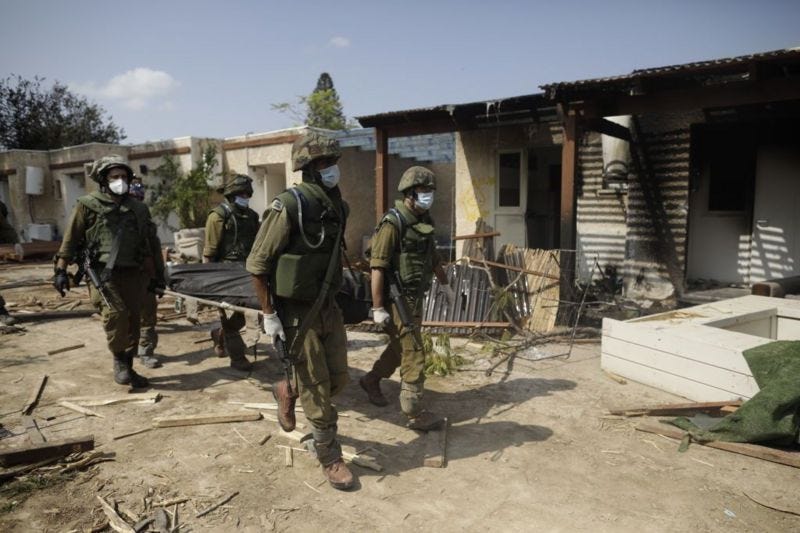
Tatiana explains that some of her acquaintances are sending their young children back to Russia right now to get them away from the rocket attacks. She says she doesn't know how she would react if her son were younger. But he's 17, and in recent days, Tatiana says, "he's the one reassuring me, not the other way around."
So, no, she hasn't regretted their decision once. Tatiana says she is happy that she finally got to see firsthand what true patriotism means, the value that the life of every citizen holds for the country. Despite the current nightmare, she feels safe. It sounds paradoxical, but that's how it is, she says. She doesn’t wants to run anywhere – not to another city, not to another country. She's had enough evacuations. She's home.
"Over the course of two days, I became the kind of Israeli I never thought I'd be"
In Israel, the immigration of Jews to their historical homeland is referred to as "Aliyah," and it is made possible by the "Law of Return." Aliyah from Russia and other post-Soviet countries has allowed hundreds of thousands of people to move to Israel over the past few decades. Currently, Israel is home to over 1.3 million Russian-speaking Jews, primarily from Russia and Ukraine, among its population of over 9 million.
Emigration often occurs in waves. For example, the period from the late 1980s when hundreds of thousands of people from the former USSR moved to Israel in just a few years is known as the "Great Aliyah." The process slowed in the 2000s but then accelerated again after 2010. This wave is often referred to as the "Putin Aliyah" in Israel, as it is associated with increased repression in Russia. According to the Israeli Agency for Jewish Education, from 2010 to 2019, more than 66,000 immigrants moved to Israel from Russia, more than from any other country.
The next wave of repatriation began after Russia's invasion of Ukraine. Last year, more than 70,000 people repatriated to Israel, with about 60,000 coming from Ukraine, Russia, and Belarus. Among them, over 35,000 were Russians. The statistics for this year have not been published yet; typically, the Ministry of Aliyah and Integration releases this data in early December.
Maria Rapoport, moved to Israel with her husband and daughter earlier this year. She spent 10 months in Georgia before relocating to Israel, following Russia's invasion of Ukraine.
"I left Russia in March 2022 because I strongly condemn this attack [on Ukraine] and believe that one cannot live in a country with fascists," she says.
Maria moved to Israel because she wanted to find a country where she would be "not a guest, not a refugee, but a citizen”. Thanks to her Jewish roots, Israel became that country for her. After the Hamas attack, Maria says she now feels that she truly belongs.
“I became an Israeli on paper within two weeks of my arrival, in January 2023. But becoming a citizen is not just about obtaining documents and a passport; it's about feeling a sense of belonging to this people and this country. I'm 50 years old, and these things don't happen quickly, but in these two days, I became the kind of Israeli I never thought I'd be."
Maria's family lives in Arad, a city in the southeast of the country, about 70 km from Gaza. The city is in the middle of the desert, within the 80km radius zone considered the most dangerous place to be when trouble starts.
On 7 October at 6:37 AM, sirens sounded in Arad.
"We were sleeping,” says Maria. “I had a friend visiting from Kyiv, who had experienced a similar situation there, so it was somehow familiar for her, but not for me."
Maria says when she moved to Arad, one of the first things she did was the find the location of their nearest shelter. "I had no illusions about where I had moved to," she says.
When the sirens went off they headed to the shelter and stayed there for the next hour and a half.
"We could hear the sounds of interceptions made by the Iron Dome, and there was a streak in the sky (the trail of a rocket). At that moment, there was no fear, just confusion. Everyone knows that the 'Dome' works well and intercepts most of the rockets, so there was no panic. Some residents didn't even come to the shelter because, for Arad, this was a rare occurrence, and some didn't understand what had happened. But in the middle of the day, the worst part began – we found out that the Gaza border had been breached, and Hamas terrorists had infiltrated Israeli territory. Not only we, the new immigrants, but all the residents were shocked – long-time residents said they couldn't recall anything like it," she says.
It was the incursion of Hamas fighters that led to the highest number of casualties among Israelis.
They moved into a number of towns and villages near the border, including Kfar Aza and Re'im kibbutzim, the cities of Sderot and Ofakim, and other populated areas, shooting dead hundreds of civilians and soldiers. The victims included at least 270 young people attending a music festival in the desert near Re'im, five kilometres from the Gaza border.
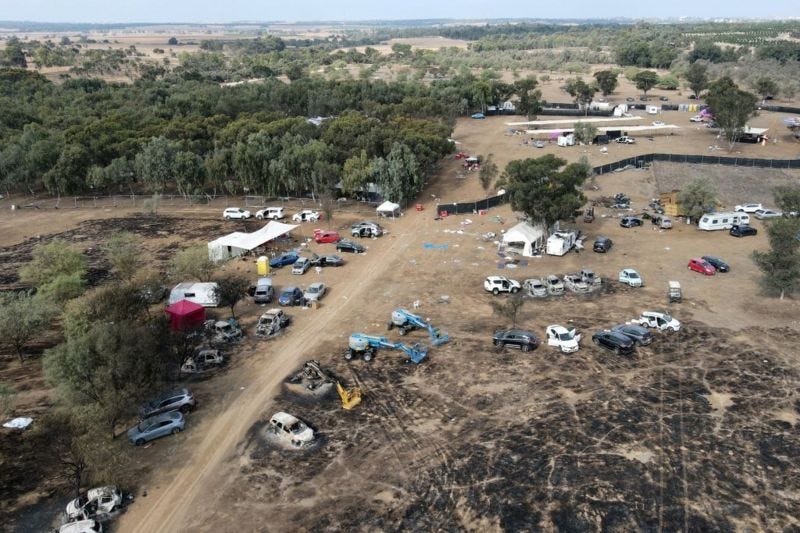
Maria told the BBC that the war has already touched every Israeli. In her circle of acquaintances, someone in every family has either been called up for reserve duty (after Hamas' attack, the Israeli authorities initiated a large-scale mobilization), or they have been involved in volunteering.
Since moving to Israel Maria has been attending Hebrew classes in the neaby town of Be'er Sheva.
Some of her classmates come from the settlement of Ofakim where there were gun battles with the Hamas fighters on the streets on the morning of 7 October.
"We were in touch with them. The city was completely liberated by the Israeli military, and in the end, everything turned out well."
Two days later in Arad, where Maria lives, people began burying the dead.
In her conversation with the BBC, Maria explained that the first night after the Hamas attack, she and her family were scared. However, they have now calmed down, and they are doing their best to help.
Like Yuri and Tatiana, Maria is impressed with the way Israelis have rallied together in response to the attacks. The whole country is united in a single impulse to protect their families and citizens, she says.
For Maria this has given her a real sense of belonging. She is grateful for the support and help being given to new arrivals at this time of crisis. “I don’t feel lost or overwhelmed,” she says. “I know we will be taken care of.”
Asked if she regrets leaving Russia, Maria is adamant that moving to Israel was the right thing to do.
“We are very concerned and frightened, but we are not panicking,” she says. “Wе have faith in the army, and if we can contribute in any way, we are ready to help.”
What was Russia’s reaction
In Russia response to the Hamas attack has been guarded. Kremlin officials have condemned the violence but President Putin's press secretary, Dmitry Peskov, said it was too early to speculate on how these events will impact Moscow's policy to the region.
According to the Russian embassy in Israel, at least two Russian citizens have been killed and at least four more are listed as missing. Hamas leaders claim there are Russian citizens among the hostages it is holding.
Moscow says people who have emigrated to Israel are welcome to return to Russia.
"Russian citizens live in many countries around the world, and Russia is their homeland. How can their homeland threaten them?" Peskov said in response to questions about whether such people would face consequences in Russia.
This was in direct contrast to previous comments before the events in Israel.
"For those who have become enemies, there probably won't be a place in our homeland," he said recently. Adding that it was important “not to overestimate” the number of such individuals.
In pro-Kremlin Telegram channels that support the war in Ukraine, the situation now facing new arrivals from Russia has been met with undisguised glee by many.
Margarita Simonyan, the head of RT, stated that she is waiting for "Russian pacifists" to leave Israel. Olga Skabeeva, a host at VGTRK, shared a meme poking fun at those who left the country amid Russia's invasion of Ukraine. Writer and war supporter Zakhar Prilepin joked that he is "concerned" about the TV host Maxim Galkin, who might be drafted into the Israeli army.
Galkin and his wife, singer Alla Pugacheva, had been living in Israel since the onset of the large-scale war in Ukraine. Following the Hamas attack, Galkin made a video this week in which he stated that he has no intention of leaving the country, and that seeing the Israeli response to the tragedy has made him understand what patriotism is.
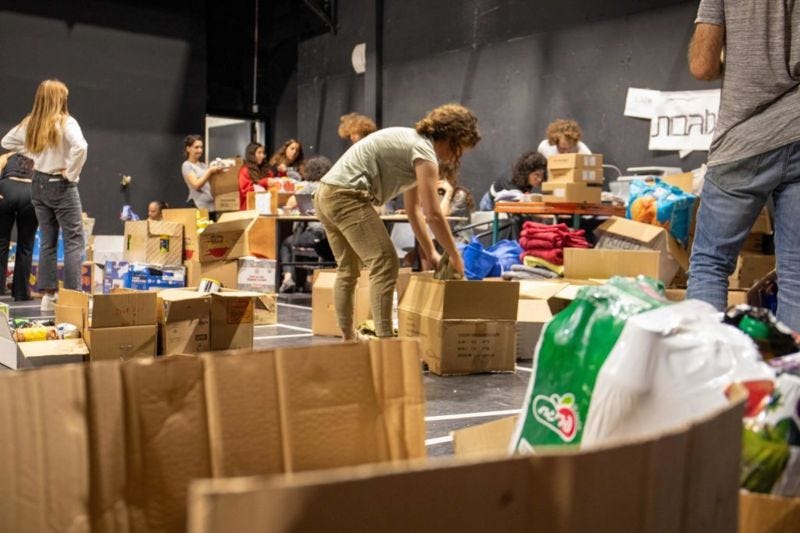
Ordinary Russian-Israelis say they’ve also been the targets of Russian trolls. Anton, a 39-year-old manager in the high-tech industry, told the BBC that he moved to Israel after Russia announced mobilization in September 2022: "I packed my suitcase, closed my apartment, and left. My car is still parked in front of the house, abandoned."
He settled in Givatayim, a small city across the highway from Tel Aviv. On 7 October at 6:30 a.m., like all other residents of Israel, he was woken up by an air raid siren. "I had heard it a few times before, but now half-awake, I initially didn't understand what this new alarm was, as I had not set it. I quickly put on whatever was at hand and ran to the bomb shelter in the basement," Anton recalls.
He met neighbours in the shelter who were "a bit shocked." On 7 October, everyone was celebrating the end of Sukkot, one of the country's major religious holidays. Anton mentions that his apartment building is primarily home to young people, some of whom were at parties and were not fully awake at the time.
Since the news of the attacks broke, Anton says he has received numerous less than sympathetic messages from acquaintances in Russia. People have sent him posts from pro-war Telegram channels, mocking and deriding the Israeli army and predicting that the country is finished. He blocks them all.
Anton’s parents still live in Russia and he says they are clearly influenced by what’s being said in the state-controlled media.
“They regularly call in hysterics after watching federal channels and reading Telegram channels filled with arguments like 'everything will be horrible, return immediately, there will be a terrible war there now, Iran will join, but you're safe in Moscow,'" he says.
“They have a fixed view of the world. They believe in Putin, and they live in Crimea. There, they are building fortifications opposite their house on the embankment, but they are convinced it's all NATO's schemes. So, it's hard for them to understand that things could be different. They do listen to me, but it's hard for them to comprehend."
Anton also says he has no plans to leave Israel. Currently, he is doing what he can to help, - donating money to the IDF (Israeli Defence Forces), planning to donate blood for those affected by the attack, and collecting items to deliver to affected areas in the south of the country at volunteer drop-off points.
"I love this country. It has given me opportunities and made me feel at home here. I don't feel panicked and have no intention of leaving. On the contrary, I have a strong sense of confidence in the rightness and necessity of what is happening. It seems like the first time I regret not having a suitable profession to volunteer more actively," Anton says.
In Tel Aviv, Yuri Saprykin, also says his friends and family in Russia are sending him "unintelligible information from Russian channels that you don't see while living here."
"My brother sent me a video from the Mash Telegram channel on the first day of the attack, showing the siren sounding at the airport, and people entering the building to take shelter. The accompanying message was: 'People are leaving Israel in droves; there are no tickets!' In general, they create the impression that everyone has abandoned everything. But in fact people are actually returning! Many of my acquaintances are coming back now. And all those videos showing queues at the airport are nonsense."
Saprykin says the way Russian propaganda is reacting to the crisis reminds of him of someone "leaving an abusive relationship": "They can't let go of those who have left, especially the well-know faces, and it all ends up looking like they are supporting the terrorist organization that is attacking Israel. And when everyone around you supports Israel, but from Russia you are getting messages saying 'Suck it up’, it generates a lot of bad, unpleasant, and angry emotions. I don't want to see this in my space."
Tatiana Aleksandrova from Ashkelon believes that Russian propagandists clearly understands the contrast between the way Israelis have rallied round to defend their country, and what she calls the “thoroughly false, disguised pseudo-support’ in Russia for the war in Ukraine. “Envy, helpless envy,” she says. “What else can these wretched cannibals do except seethe with bile?"
“It was like a flashback from February 2022”
The only part of Israel that has not yet been subjected to serious shelling and a large-scale invasion is the northern region. Despite existing concerns that the Hezbollah group might invade Israel from Lebanon, this has not happened yet
The northern city of Kiryat Motzkin, is home to another new Russian-Israeli.
Anna Kosnikovskaya, who edits a website dedicated to parenting issues, moved to Israel in September 2022 with her two children aged 8 and 11.
On 7 October Anna was looking forward to a lie in on her only day off of the week.
“We have an agreement with my children that I leave them with gadgets and breakfast, and they try not to wake me,” she says.
There were no air raid sirens in the north so Anna found out about the Hamas attacks when friends and relatives starting messaging her.
“Everyone was asking what was happening to us,” she says. “Then I went to the children, and I had a flashback to February 2022 when I had to tell them what was happening [in Ukraine]. I said it seemed like Israel was under attack.'"
Anna tries to filter information about the scale of the attack on the country for her children. On the first day of the war someone posted a video of civilian being killed, on her son’s school WhatsApp chat. Luckily she was alerted in time and deleted it before he saw it.
"I think that as long as they haven't encountered such content, I'm in control of the situation. So their state of mind is normal. Classes have been cancelled, and we stay at home. I don't let them go outside," she says.
Anna says what has happened in Israel has evoked, "nothing but a terrible, extraordinarily deep sorrow and suffering”.
"The shock from the huge number of casualties - there has never been a day when Israel lost so many citizens. It's an incredible tragedy. Israel is small, and you interact with people - the war has already touched everyone. It turns out that someone has a friend who disappeared without a trace at that same party. A colleague who didn't respond on Sunday (a working day in Israel). Some have relatives going to serve. It's everywhere - in stores, on the streets. Everyone talks only about this. Everyone is overwhelmed and confused - where we live. But life continues in the north for now," Anna explains.
Anna says she is mentally preparing herself for a situation when she and her family might need to take shelter. She has got all her documents ready, along with an emergency bag with water and snacks. She now sleeps in the same room as her children in case they need to run to a shelter at night.
After the Hamas attack, Anna's friends and relatives started suggesting that she should leave Israel. "I spoke with numerous friends, acquaintances, and new repatriates - nobody has the thought of leaving in their minds. People simply do not consider that possibility. Everyone is trying to be helpful. Those who cannot serve are trying to gather aid, donate blood, and spread information. Israeli citizens who are abroad are seeking ways to return to the country," she says.
At the same time, in Russian-speaking Israeli social media groups, Anna has seen messages from people seeking advice on whether they should temporarily leave the country (the BBC also found such messages).
These individuals often receive "harsh, unsupportive responses" along the lines of "if you're asking, then you should leave," Anna says. Although she herself acknowledges that as a mother of two children, she can understand the anxiety of such people.
"I don't regret that we came here. But in moments when this horror and anxiety sets in, maybe I have an irrational sense of guilt that in trying to take my children out of one state of war, I brought them into another war. It's not even guilt, but anger,. It’s as if there's no place left in the world where you can raise children without war. It's as if our children have to deal with this especially,” she says.
“As a mother, my heart aches not just for my children but for all the children who have suffered in these past few days. For their mothers, and for their parents."
English version edited by Jenny Norton.
Read the Russian version of this story.




